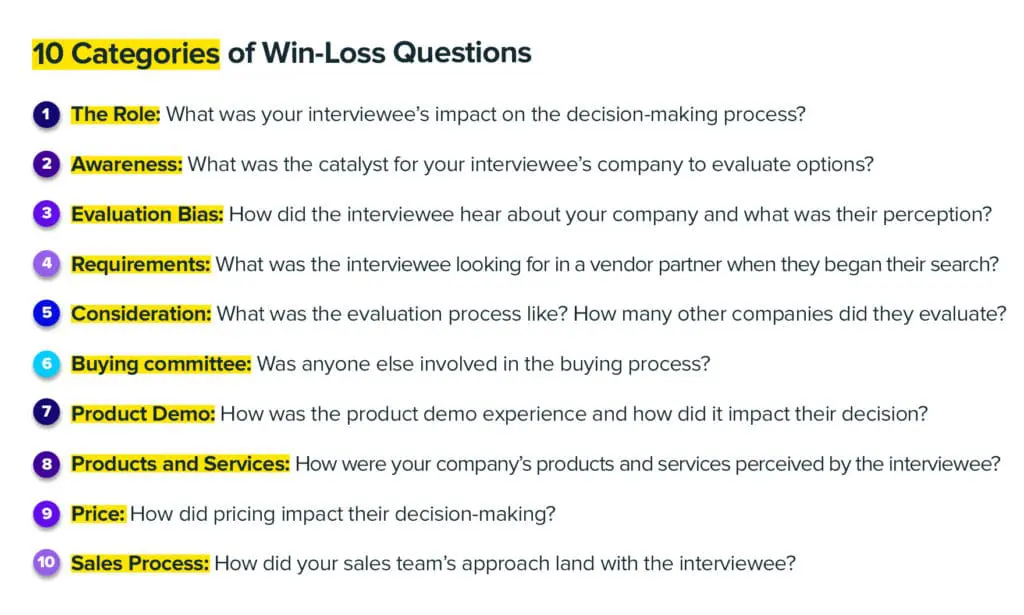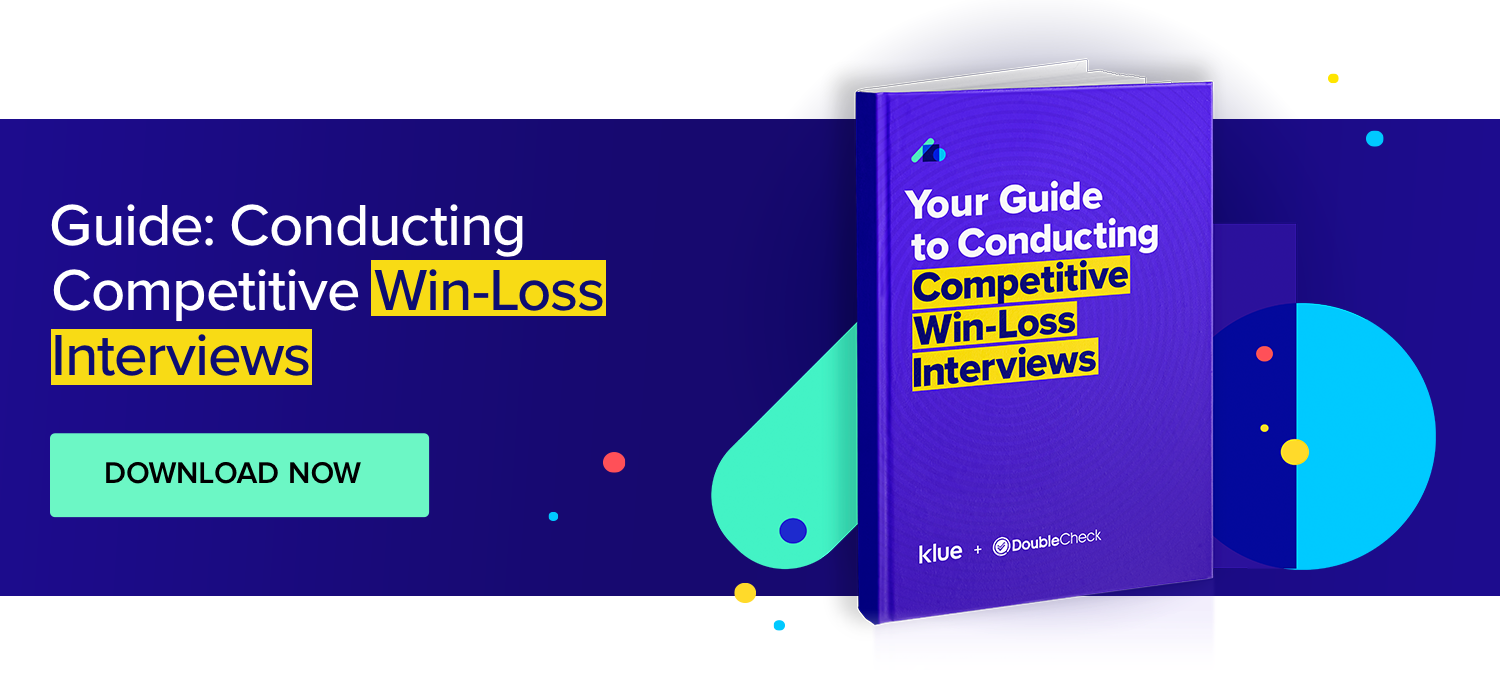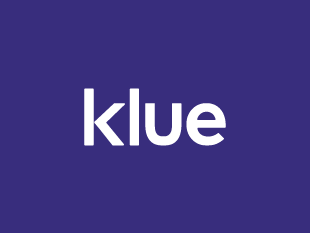Klue Compete
The Competitive Enablement Platform
Learn More
FIND OUT MORE >

What are the best win-loss analysis questions to ask during an interview with a buyer after a deal?
An honest starting point for anyone looking to cut their teeth on win-loss analysis.
At the same time, this is the wrong way to go about it.
Before we put on our detective hats, dust off our line of questioning, and channel our inner Sherlock Holmes… stop!
Take a breath. And read on.
In this blog, we’ll cover:


The first win-loss questions you should be asking happen well before the buyer interview even begins.
Your initial questions need to be geared to your stakeholders, which when it comes to win-loss analysis, are the departmental leaders within your organization.
These are the people who will make business decisions based off of your win-loss findings, meaning that your work should be tailored to what they’re looking to learn.
This is called identifying your learning objectives.
“When launching your win-loss program, you need to know what the individual objectives are for each one of your functional areas, so I always recommend going to the leader within each group first,” said Ryan Sorley, CEO and Founder of DoubleCheck Research, at the Winner’s Circle event hosted by the Compete Network.
What are the internal questions you should ask, then?
It starts with two simple questions:
These are broad questions, obviously. But it sets the stage for you to dig deeper, by asking:
Grab your shovel and keep digging. This is where you get a more coloured picture of how win-loss can bring value to different departments, and ensure that the insights you bring don’t just sit in a slide deck collecting dust.
Conducting internal discovery not only makes you more confident entering a win-loss interview that you’re not tossing darts at a board blindfolded, but it’s also unlocks the secret to success for your win-loss program.
Internal buy-in.
“Those leaders start to lean into the program that much more. They get excited about the outcome that is yet to come, and they start to visualize what it is that you’ll be producing for them,” says Ryan Sorley.
“You end up getting a lot of people to have a sense of ownership of the win-loss program. It becomes stickier and the program takes off as a result of it.”
Think about your company’s messaging a year ago.
I’m sure it’s drastically different than today. More empathetic, considering the times that we’re currently in, perhaps?
This is just one example of how constantly you — and your competitor’s — go-to-market, product offerings and messaging are changing.
As such, you need to be asking questions that generate feedback relevant to these business decisions and strategies so that your executives can make more informed decisions, faster than the rest of the market.
While certain win-loss questions are evergreen, the ability to ask ones that unveil buyer intelligence on how your strategies are landing in the market today is what transforms a good win-loss program, into a great one explained Valerie Bonaldo, Director of Product Marketing Competitive Intelligence at Seismic, at the Winner’s Circle.
“When doing win-loss, we have a core set of questions that we stick with because we want to know the importance of what the buyer is looking for and how our sales team is engaging with them across the sales cycle.
But maybe we would want to measure how a recent product launch went? How some new messaging was presented in the sales cycle? We’ll pull out data specific to that within the interview guide and look for the qualitative results around what the customer’s real impressions were and how something resonated.”
It’s in those moments where win-loss can work its magic, especially when executives are dying to know why a big strategic bet they’ve made is (or isn’t) bringing desired results.
“The great thing about being able to do a quarter-over-quarter win-loss program is to be able to go back and look to see what was consistent in our surveying and in our questions, as well as where we see the conversations shift as we brought forth new initiatives and new features.”
No matter what, make sure you’re asking questions that acknowledge every step in the buying process.
Generally, there are 10 steps in the buyer journey you need to consider when conducting a win-loss analysis interview.


Here are a few questions that you can ask within each category:
Guilty! There is indeed a 31st question. It’s one that comes at the end of your interview — and happens to be the most fun of the bunch.
If you want to check that question out, as well as the secret to nailing your win-loss interview courtesy of the experts over at DoubleCheck Research… it’s all here waiting for you.




Competitive Enablement
Product marketers conducting competitive research are drowning in reviews, reports, and messy notes. Here's how Klue's AI foundation will help you complete this analysis in seconds, not weeks.


Competitive Enablement
The topic of Large Language Models (LLMs) has a lot of confusion. Here's what you need to know about how Klue is working with them.


Let’s do it. Tell us a bit about yourself and we’ll set up a time to wow you.
Let's do it. Tell us a bit about yourself and we'll set up a time to wow you.
XLet's do it. Tell us a bit about yourself and we'll set up a time to wow you.
XSubscribe to get our latest AI functionality and news in your inbox.
XOur Buyer Pulse feature, set to launch in Q2 2024, offers valuable insights into the factors influencing buyer decisions in your pipeline. By signing up for the waitlist, we can better gauge interest and proactively engage with you to streamline the setup and integration process before the feature becomes widely available.
X